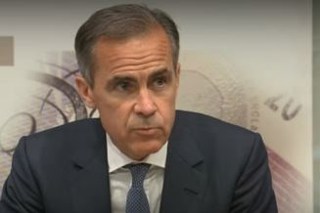Threats to car finance firms and demand for new and used cars have been highlighted once again after the Governor of the bank of England warned that inflation might peak at over 3% next month.
Mark Carney told MPs on the Treasury Committee that such a rise “is something we have anticipated" because of the fall in the value of the pound in a meeting on Tuesday morning.
His comments came as inflation reached its highest level for five years, the Consumer Prices Index (CPI) having climbed to 3%.
The pattern has increased the likelihood of a rise in interest rates from the current low of 0.25% and the effects could be felt by a car retail sector already reeling from September’s 9.3% new car registrations slump.
In a climate where household debt levels as a proportion of national income have surged back to 137% over the past two years – households having racked up unsecured debts of £203 billion on credit cards, car finance, overdrafts and other loans – customer confidence could be hard hit.
Bloomberg reported that the changing marketplace could leave Britain’s banks nervous about their £24 billion pounds exposure to car loans as conditions pose a threat to car prices and the viability of PCPs, whose affordability is closely tied to vehicle RVs.
Lloyds Banking Group Plc, Britain’s largest mortgage lender, has £11.6 billion of car loans on its books, according to JPMorgan Chase & Co. analysts.
Its car finance arm, Black Horse, boosted its assets by 20% last year, including its joint venture with Jaguar Land Rover and Lex Autolease business.
While auction houses have reported demand remaining buoyant – average used car prices reaching record levels for BCA and Manheim in September – rising inflation and interest rates could have an effect on values as 2017 draws to a close.
Philip Rush, chief economist at Heteronomics in London, told Bloomberg: “If the demand for new vehicles stalls, then the credit quality of car finance companies deteriorate, that’s the transmission channel that could lead to a wider shock for the industry.”
The Bank of England is set to report the results of stress tests on banks on November28th that will include the impact of falling used car prices in 10% increments on capital and financial performance.
Rush said: “A 10% drop is manageable and it’s already factored in those contracts. However, if prices fall below that, they will fall a lot of quicker and there could be the same phenomena seen in US during the subprime crisis where people gave their houses key back instead of serving the debts as prices were collapsing.”
A spokesman for Lloyds said that the business conducts “regular stress tests to assess the impact of potential future market reductions in car valuations and are comfortable with our exposures based on these.”
However, UBS Group AG analysts estimated in a report on Wednesday that, if losses on car loans increase by 1ppt more than expected, Lloyds’s pretax profit in 2018 could decline by 2%.
The same measure is more than 6% for Close Brothers Group Plc, the report found.


















Login to comment
Comments
No comments have been made yet.